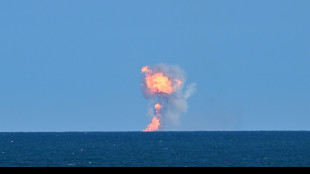
-
 'No controversy' around Alldritt exclusion for Argentina Test
'No controversy' around Alldritt exclusion for Argentina Test
-
Stock markets gain, dollar higher before Nvidia earnings

-
 New WHO financing mechanism put to the test
New WHO financing mechanism put to the test
-
Besigye kidnapping: Uganda president's doctor turned rival

-
 Star K-pop producer of NewJeans quits after legal spat with BTS agency
Star K-pop producer of NewJeans quits after legal spat with BTS agency
-
'Eternal' Nadal leaves legacy as he retires from tennis

-
 Vieira takes over at struggling Gerona
Vieira takes over at struggling Gerona
-
Australia's Kerevi banned for Morgan tackle

-
 Bellamy defies 'lunatic' reputation to inspire Wales revival
Bellamy defies 'lunatic' reputation to inspire Wales revival
-
Kremlin says US 'doing everything' to prolong 'war' in Ukraine

-
 Magritte painting nets auction record of $121 million
Magritte painting nets auction record of $121 million
-
Markets fluctuate as traders weigh geopolitical tensions

-
 N. Korea's latest weapon? Bombarding South with noise
N. Korea's latest weapon? Bombarding South with noise
-
'Kidnapped' Uganda opposition figure Besigye to appear at military court: lawyer

-
 Asian markets fluctuate as traders weigh geopolitical tensions
Asian markets fluctuate as traders weigh geopolitical tensions
-
'An inauspicious day': the landmines ruining Myanmar lives

-
 UN to vote again on Gaza ceasefire, US plans unclear
UN to vote again on Gaza ceasefire, US plans unclear
-
Japan's manga powerhouse 'Dragon Ball' turns 40

-
 Japanese, Koreans bottom of global love life survey
Japanese, Koreans bottom of global love life survey
-
Son blames 'mistakes' after South Korea held by Palestine in qualifier

-
 Japan ramps up tech ambitions with $65 bn for AI, chips
Japan ramps up tech ambitions with $65 bn for AI, chips
-
Lights, action, melodrama! Silent films get new reel at London haven

-
 Myanmar led world in landmine victims in 2023: monitor
Myanmar led world in landmine victims in 2023: monitor
-
ICC to sentence Timbuktu war criminal

-
 Ugandan opposition figure Besigye 'kidnapped', says wife
Ugandan opposition figure Besigye 'kidnapped', says wife
-
Australia's Jason Day eyes more major glory after resurgence

-
 Machu Picchu security boosted after visitors spread human ashes
Machu Picchu security boosted after visitors spread human ashes
-
Popovic hails Australia character in 'crazy' World Cup qualifier

-
 Taliban govt clearing 'un-Islamic' books from Afghanistan shelves
Taliban govt clearing 'un-Islamic' books from Afghanistan shelves
-
Argentina beat Peru as Uruguay hold Brazil

-
 Asian markets struggle as traders weigh geopolitical tensions
Asian markets struggle as traders weigh geopolitical tensions
-
Tatum stars as Celtics end Cavaliers unbeaten start

-
 Hurting India under pressure in blockbuster five-Test Australia series
Hurting India under pressure in blockbuster five-Test Australia series
-
'They killed her dream': Israel strike leaves woman footballer in coma

-
 Iraq holds its first census in nearly 40 years
Iraq holds its first census in nearly 40 years
-
Iraqis face tough homecoming a decade after IS rampage

-
 Russian net tightens around last civilians left in eastern Ukraine
Russian net tightens around last civilians left in eastern Ukraine
-
Olympic champion Tebogo aims to inspire next generation of African athletes

-
 Valencia on target as ten-man Ecuador upset Colombia
Valencia on target as ten-man Ecuador upset Colombia
-
'Rust' to premiere three years after on-set shooting

-
 Strike at French cognac maker Hennessy over measures in China spat
Strike at French cognac maker Hennessy over measures in China spat
-
Xi, Lula meet in Brasilia to 'enhance ties'

-
 SpaceX fails to repeat Starship booster catch, as Trump watches on
SpaceX fails to repeat Starship booster catch, as Trump watches on
-
'I have left a legacy': Nadal retires from tennis

-
 US recognizes Venezuela opposition's Gonzalez Urrutia as 'president-elect'
US recognizes Venezuela opposition's Gonzalez Urrutia as 'president-elect'
-
European powers, US seek to censure Iran at UN nuclear watchdog board

-
 UNAIDS chief says husband, Ugandan opposition figure Besigye, 'kidnapped'
UNAIDS chief says husband, Ugandan opposition figure Besigye, 'kidnapped'
-
Nadal's sensational career ends as Netherlands defeat Spain in Davis Cup

-
 US announces talks with Israel over civilian casualties in Gaza
US announces talks with Israel over civilian casualties in Gaza
-
SpaceX fails to repeat Starship booster catch, as Trump looks on


Saving the vanishing forests of Iraq's Kurdistan
In a plant nursery in northern Iraq's autonomous Kurdistan region, hundreds of pine, eucalyptus, olive and pomegranate saplings grow under awnings protecting them from the fierce summer sun.
The nursery in Sarchinar in the Kurdish city of Sulaimaniyah is part of efforts to battle the destructive effects of deforestation in the region.
"Almost 50 percent of forests have been lost in Kurdistan in 70 years," said Nyaz Ibrahim of the UN's World Food Programme (WFP).
She attributed the loss to "water scarcity, rising temperatures, irregular decreasing rainfall and also fire incidents".
The loss is catastrophic, as the Kurdistan region is home to 90 percent of forests in Iraq, which has been among the hardest hit globally by climate change and desertification.
Much of this comes down to illegal tree felling and forest fires -- intensified by summer droughts -- as well as military operations on Iraq's northern border.
In the nursery -- the oldest in Iraq -- workers are busy unloading young saplings from a trailer which they then line up on a patch of land.
Here, some 40 varieties are developed to later be planted in forests or given to farmers, among them pines, cypresses, junipers and oaks -- the emblematic tree of the Kurdish forest.
"Climate change has an impact on the development of plants," said agricultural engineer Rawa Abdulqader. "So we prioritise trees that can withstand high temperatures and which consume less water."
- 'Negligence' -
With support from the WFP, micro-mesh nets were installed in the nursery to protect the trees from the sun, accelerating growth and minimising evaporation.
Other greenhouses have been equipped with hanging sprinklers, which are more water-efficient.
The project has helped Sarchinar's annual production grow from 250,000 sprouts before it began in late 2022, to 1.5 million in 2024.
Over five years, the WFP intends to support authorities and local actors to plant 38 million trees over more than 61,000 hectares in Kurdistan, and work to preserve 65,000 forested hectares.
According to two official studies, between 1957 and 2015, more than 600,000 hectares were lost.
Over the last 14 years, some 290,000 hectares have been hit by fires, said Halkawt Ismail, director of the forestry office in Kurdistan's agriculture ministry.
These fires "break out mainly during the summer drought... and above all because of the negligence of citizens", he said.
He added that illegal logging in the 1990s by locals using the wood to warm their homes during an economic crisis had significantly contributed to the shrinking of forests.
- Conflict and displacement -
Elsewhere in Kurdistan, forests have been the collateral damage of fighting between the Turkish army and militants from the Kurdistan Workers' Party (PKK).
This summer, Kurdish media and organisations said Ankara's bombardment of the PKK triggered several forest fires.
In late June, the Turkish defence ministry accused the PKK of lighting fires to reduce visibility and conceal its positions.
"Turkey has established over 40 military outposts and bases" in Iraqi Kurdistan, "logged many dozens of kilometres of roads through forested areas, and cleared forest around their bases," Wim Zwijnenburg, a researcher with the Dutch peace-building group PAX, told AFP.
"This practice has increased sharply since 2020," he said.
A decrease in forest supervision resulting from conflict and displacement, and rising temperatures and drought "provide fertile ground for forest fires".
These can either be the result of "natural causes, or of bombing and fighting from the Turkey-PKK conflicts", he added.
"With limited or absent forest management, these fires can affect larger areas and lead to forest loss," Zwijnenburg said.
Kamaran Osman, human rights officer from the Community Peacemaker Teams organisation, meanwhile noted that when areas are bombed, "people cannot go to... extinguish the fire, because they fear being bombed as well."
- 1 million oaks -
Authorities are working to cultivate new forests and to increase nursery production, though they lack sufficient human and financial resources.
Civil society has also got involved. In Sulaimaniyah, which is encircled by hills, activists are fighting bulldozers and excavators eating away at the slopes of Mount Goizha for a real estate project.
On the edges of the city, luxury housing complexes and shiny glass towers are already rising on the hillside.
In the regional capital of Arbil, a campaign launched by local organisations aims to plant 1 million oak trees.
Since 2021, 300,000 trees have been planted, said Gashbin Idrees Ali, the project manager.
"Climate change is happening and we cannot stop it. But we should adapt to it," he said.
Oak trees were chosen because they "need less water", he said.
"We supervise the tree's growth for four to five years and after... it can survive for hundreds of years."
S.Jackson--AT
